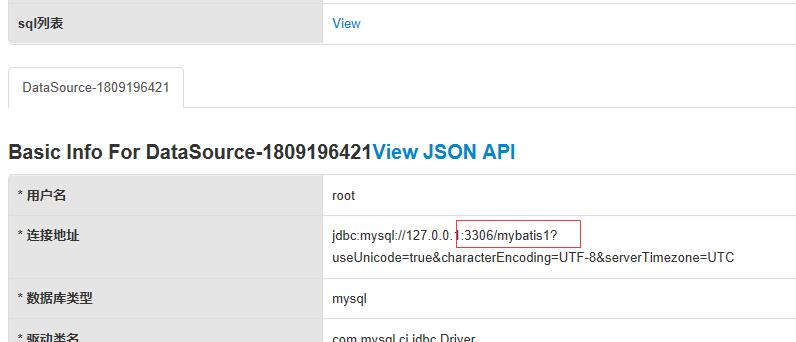SpringBoot入门之基于Druid配置Mybatis多数据源
上一篇了解了Druid进行配置连接池的监控和慢sql处理,这篇了解下使用基于基于Druid配置Mybatis多数据源。SpringBoot默认配置数据库连接信息时只需设置url等属性信息就可以了,SpringBoot就会基于约定根据配置信息实例化对象,但是一般大型的项目都是有多个子系统或者多个数据源组成,那怎么使用SpringBoot进行Mybatis多数据源配置呢?
一、数据库准备
我们这里准备使用主从两个数据库来进行演示多数据源配置。一个主库用来写write,一个从库用来读read.至于两个数据库的数据同步问题这里暂时不考虑。两个数据库只是数据库名不一样,主库为mybatis1,从库为mybatis,表结构是一样的。
主库(write):
CREATE DATABASE `mybatis1` /*!40100 DEFAULT CHARACTER SET utf8 */; CREATE TABLE `user` ( `id` int(11) NOT NULL AUTO_INCREMENT, `name` varchar(20) DEFAULT NULL, `age` int(11) DEFAULT NULL, PRIMARY KEY (`id`) ) ENGINE=InnoDB AUTO_INCREMENT=19 DEFAULT CHARSET=utf8;
从库(read):
CREATE DATABASE `mybatis` /*!40100 DEFAULT CHARACTER SET utf8 */; CREATE TABLE `user` ( `id` int(11) NOT NULL AUTO_INCREMENT, `name` varchar(20) DEFAULT NULL, `age` int(11) DEFAULT NULL, PRIMARY KEY (`id`) ) ENGINE=InnoDB AUTO_INCREMENT=19 DEFAULT CHARSET=utf8;
二、引入依赖
这里主要引入mysql数据库、mybatis架构、Druid相关的SpringBoot依赖。下面的是由于要使用jsp显示内容所以也假如了jsp相关的依赖。

<?xml version="1.0" encoding="UTF-8"?> <project xmlns="http://maven.apache.org/POM/4.0.0" xmlns:xsi="http://www.w3.org/2001/XMLSchema-instance" xsi:schemaLocation="http://maven.apache.org/POM/4.0.0 http://maven.apache.org/xsd/maven-4.0.0.xsd"> <modelVersion>4.0.0</modelVersion> <groupId>com.example</groupId> <artifactId>demo</artifactId> <version>0.0.1-SNAPSHOT</version> <packaging>jar</packaging> <name>demo</name> <description>Demo project for Spring Boot</description> <parent> <groupId>org.springframework.boot</groupId> <artifactId>spring-boot-starter-parent</artifactId> <version>2.0.1.RELEASE</version> <relativePath/> <!-- lookup parent from repository --> </parent> <properties> <project.build.sourceEncoding>UTF-8</project.build.sourceEncoding> <project.reporting.outputEncoding>UTF-8</project.reporting.outputEncoding> <java.version>1.8</java.version> </properties> <dependencies> <dependency> <groupId>org.springframework.boot</groupId> <artifactId>spring-boot-starter-web</artifactId> </dependency> <!-- https://mvnrepository.com/artifact/org.thymeleaf/thymeleaf-spring5 <dependency> <groupId>org.thymeleaf</groupId> <artifactId>thymeleaf-spring5</artifactId> <version>3.0.9.RELEASE</version> </dependency> --> <dependency> <groupId>org.apache.tomcat.embed</groupId> <artifactId>tomcat-embed-jasper</artifactId> <scope>provided</scope> </dependency> <dependency> <groupId>javax.servlet</groupId> <artifactId>jstl</artifactId> <scope>provided</scope> </dependency> <dependency> <groupId>javax.servlet</groupId> <artifactId>javax.servlet-api</artifactId> <scope>provided</scope> </dependency> <dependency> <groupId>org.springframework.boot</groupId> <artifactId>spring-boot-starter-test</artifactId> <scope>test</scope> </dependency> <!-- https://mvnrepository.com/artifact/org.mybatis.spring.boot/mybatis-spring-boot-starter --> <dependency> <groupId>org.mybatis.spring.boot</groupId> <artifactId>mybatis-spring-boot-starter</artifactId> <version>1.3.2</version> </dependency> <!-- https://mvnrepository.com/artifact/mysql/mysql-connector-java --> <dependency> <groupId>mysql</groupId> <artifactId>mysql-connector-java</artifactId> <version>8.0.11</version> </dependency> <dependency> <groupId>com.alibaba</groupId> <artifactId>druid-spring-boot-starter</artifactId> <version>1.1.10</version> </dependency> <dependency> <groupId>org.springframework.boot</groupId> <artifactId>spring-boot-configuration-processor</artifactId> <optional>true</optional> </dependency> </dependencies> <build> <plugins> <plugin> <groupId>org.springframework.boot</groupId> <artifactId>spring-boot-maven-plugin</artifactId> </plugin> </plugins> </build> </project>
三、创建Mapper
从这里开始就比较坑了,为了写这篇博客昨天搞到夜里两点中,Druid官方介绍的比较少,demo也不是与mybatis相结合,就倒置怎么把mapper与数据源配置对照上也是问题,因为默认单数据源的话,配置下数据源信息以及Mapper就好,但是如果是多数据源那就要手动指定数据源在哪里,怎么和Mapper对照上。
这里先创建两个Mappe,一个是写的一个是读的。这里要注意的地方是要加上@Mapper注解。

ReadUserMapper:

package com.example.read.mapper; import java.util.List; import com.example.model.User; import org.apache.ibatis.annotations.Delete; import org.apache.ibatis.annotations.Insert; import org.apache.ibatis.annotations.Mapper; import org.apache.ibatis.annotations.Result; import org.apache.ibatis.annotations.Results; import org.apache.ibatis.annotations.Select; import org.apache.ibatis.annotations.Update; @Mapper public interface ReadUserMapper { @Select("SELECT name FROM user") @Results({ @Result(property = "Name", column = "name") }) List<User> getAll(); @Select("SELECT name FROM user WHERE id = #{id}") @Results({ @Result(property = "Name", column = "name") }) User getOne(int id); @Insert("INSERT INTO user(name,age) VALUES(#{name}, #{age})") void insert(User user); @Update("UPDATE user SET name=#{name},age=#{age} WHERE id =#{id}") void update(User user); @Delete("DELETE FROM user WHERE id =#{id}") void delete(int id); }
WriteUserMapper:

package com.example.write.mapper; import java.util.List; import org.apache.ibatis.annotations.Delete; import org.apache.ibatis.annotations.Insert; import org.apache.ibatis.annotations.Mapper; import org.apache.ibatis.annotations.Result; import org.apache.ibatis.annotations.Results; import org.apache.ibatis.annotations.Select; import org.apache.ibatis.annotations.Update; import com.example.model.*; @Mapper public interface WriteUserMapper { @Select("SELECT name FROM user") @Results({ @Result(property = "Name", column = "name") }) List<User> getAll(); @Select("SELECT name FROM user WHERE id = #{id}") @Results({ @Result(property = "Name", column = "name") }) User getOne(int id); @Insert("INSERT INTO user(name,age) VALUES(#{name}, #{age})") void insert(User user); @Update("UPDATE user SET name=#{name},age=#{age} WHERE id =#{id}") void update(User user); @Delete("DELETE FROM user WHERE id =#{id}") void delete(int id); }
四、配置数据源
如果使用SpringBoot默认配置类,可以直接在application.properties中配置就好了,它会自动扫描mapper类与数据源进行关联,但是如果是多个数据源的话,那就需要进行手动配置。这里分别创建了读DataSourceReadConfig、写DataSourceWriteConfig数据源配置类。
DataSourceWriteConfig:

package com.example.config; import javax.sql.DataSource; import org.apache.ibatis.session.SqlSessionFactory; import org.mybatis.spring.SqlSessionFactoryBean; import org.mybatis.spring.SqlSessionTemplate; import org.mybatis.spring.annotation.MapperScan; import org.springframework.beans.factory.annotation.Qualifier; import org.springframework.boot.context.properties.ConfigurationProperties; import org.springframework.context.annotation.Bean; import org.springframework.context.annotation.Configuration; import org.springframework.context.annotation.Primary; import org.springframework.jdbc.datasource.DataSourceTransactionManager; import org.springframework.stereotype.Component; import com.alibaba.druid.spring.boot.autoconfigure.DruidDataSourceBuilder; @Configuration @MapperScan(basePackages = "com.example.write.mapper", sqlSessionTemplateRef = "writeSqlSessionTemplate") public class DataSourceWriteConfig { @Bean(name = "writeDataSource") @ConfigurationProperties(prefix = "spring.datasource.druid.write") @Qualifier("writeDataSource") @Primary public DataSource writeDataSource() { return DruidDataSourceBuilder.create().build(); } @Bean(name = "writeSqlSessionFactory") @Primary public SqlSessionFactory writeSqlSessionFactory(@Qualifier("writeDataSource") DataSource dataSource) throws Exception { SqlSessionFactoryBean bean = new SqlSessionFactoryBean(); bean.setDataSource(dataSource); return bean.getObject(); } @Bean(name = "writeTransactionManager") @Primary public DataSourceTransactionManager writeTransactionManager(@Qualifier("writeDataSource") DataSource dataSource) { return new DataSourceTransactionManager(dataSource); } @Bean(name = "writeSqlSessionTemplate") @Primary public SqlSessionTemplate writeSqlSessionTemplate(@Qualifier("writeSqlSessionFactory") SqlSessionFactory sqlSessionFactory) throws Exception { return new SqlSessionTemplate(sqlSessionFactory); } }
DataSourceReadConfig:

package com.example.config; import javax.sql.DataSource; import org.apache.ibatis.session.SqlSessionFactory; import org.mybatis.spring.SqlSessionFactoryBean; import org.mybatis.spring.SqlSessionTemplate; import org.mybatis.spring.annotation.MapperScan; import org.springframework.beans.factory.annotation.Qualifier; import org.springframework.boot.context.properties.ConfigurationProperties; import org.springframework.context.annotation.Bean; import org.springframework.context.annotation.Configuration; import org.springframework.jdbc.datasource.DataSourceTransactionManager; import com.alibaba.druid.spring.boot.autoconfigure.DruidDataSourceBuilder; @Configuration @MapperScan(basePackages = "com.example.read.mapper", sqlSessionTemplateRef = "readSqlSessionTemplate") public class DataSourceReadConfig { @Bean(name = "readDataSource") @ConfigurationProperties(prefix = "spring.datasource.druid.read") @Qualifier("readDataSource") public DataSource readDataSource() { return DruidDataSourceBuilder.create().build(); } @Bean(name = "readSqlSessionFactory") public SqlSessionFactory readSqlSessionFactory(@Qualifier("readDataSource") DataSource dataSource) throws Exception { SqlSessionFactoryBean bean = new SqlSessionFactoryBean(); bean.setDataSource((javax.sql.DataSource) dataSource); return bean.getObject(); } @Bean(name = "readTransactionManager") public DataSourceTransactionManager readTransactionManager(@Qualifier("readDataSource") DataSource dataSource) { return new DataSourceTransactionManager(dataSource); } @Bean(name = "readSqlSessionTemplate") public SqlSessionTemplate readSqlSessionTemplate(@Qualifier("readSqlSessionFactory") SqlSessionFactory sqlSessionFactory) throws Exception { return new SqlSessionTemplate(sqlSessionFactory); } }
这部分是遇到坑最多的地方,由于Druid官方github上并没有具体参考的demo,看其他的博客又与gitgub介绍的有出入,比如获取配置类中获取DataSource方法中,其他我看使用的是DataSourceBuilder,但Druid GitHub上的是DruidDataSourceBuilder,不知道是不是版本的问题,如果使用DataSourceBuilder,配置多数据库时不起作用。github上也有这句话:Spring Boot 2.X 版本不再支持配置继承,多数据源的话每个数据源的所有配置都需要单独配置,否则配置不会生效。还有就是DataSource引入的包名,我开始引入的并不是import javax.sql.DataSource;这个也是一个坑。
五、Druid多数据源配置
这里也遇到了坑,由于在配置数据源类中并未使用DruidDataSourceBuilder,而是使用的DataSourceBuilder,这就导致下面配置的没用,而且在设置数据库url还报错,需要使用jdbc-url.

spring.mvc.view.prefix=/view/ spring.mvc.view.suffix=.jsp mybatis.type-aliases-package=com.example.model #mybatis.config-location=classpath:mybatis/mybatis-config.xml #mybatis.mapper-locations=classpath:mybatis/mapper/*.xml spring.datasource.druid.read.web-stat-filter.enabled=true spring.datasource.druid.read.web-stat-filter.url-pattern=/* spring.datasource.druid.read.web-stat-filter.exclusions=*.js,*.gif,*.jpg,*.png,*.css,*.ico,/druid/* spring.datasource.druid.read.web-stat-filter.session-stat-enable=true spring.datasource.druid.read.web-stat-filter.session-stat-max-count=1000 spring.datasource.druid.read.stat-view-servlet.enabled= true spring.datasource.druid.read.stat-view-servlet.url-pattern=/druid/* spring.datasource.druid.read.stat-view-servlet.reset-enable=true spring.datasource.druid.read.stat-view-servlet.login-username=druid spring.datasource.druid.read.stat-view-servlet.login-password=123456 spring.datasource.druid.read.stat-view-servlet.allow=127.0.0.1 spring.datasource.druid.read.stat-view-servlet.deny=192.168.0.19 spring.datasource.druid.read.aop-patterns=com.example.read.mapper.* spring.datasource.druid.read.url =jdbc:mysql://127.0.0.1:3306/mybatis?useUnicode=true&characterEncoding=UTF-8&serverTimezone=UTC spring.datasource.druid.read.username = root spring.datasource.druid.read.password = 123456 spring.datasource.druid.read.driver-class-name=com.mysql.cj.jdbc.Driver spring.datasource.druid.read.type=com.alibaba.druid.pool.DruidDataSource spring.datasource.druid.write.max-active=20 spring.datasource.druid.write.initial-size=1 spring.datasource.druid.write.max-wait=60000 spring.datasource.druid.write.pool-prepared-statements=true spring.datasource.druid.write.max-pool-prepared-statement-per-connection-size=20 spring.datasource.druid.write.connection-properties=druid.stat.mergeSql=true;druid.stat.slowSqlMillis=5000 spring.datasource.druid.write.min-idle=1 spring.datasource.druid.write.time-between-eviction-runs-millis=60000 spring.datasource.druid.write.min-evictable-idle-time-millis=300000 spring.datasource.druid.write.validation-query=select 1 from dual spring.datasource.druid.write.test-while-idle=true spring.datasource.druid.write.test-on-borrow=true spring.datasource.druid.write.test-on-return=true spring.datasource.druid.write.web-stat-filter.enabled=true spring.datasource.druid.write.web-stat-filter.url-pattern=/* spring.datasource.druid.write.web-stat-filter.exclusions=*.js,*.gif,*.jpg,*.png,*.css,*.ico,/druid/* spring.datasource.druid.write.web-stat-filter.session-stat-enable=true spring.datasource.druid.write.web-stat-filter.session-stat-max-count=1000 spring.datasource.druid.write.stat-view-servlet.enabled= true spring.datasource.druid.write.stat-view-servlet.url-pattern=/druid/* spring.datasource.druid.write.stat-view-servlet.reset-enable=true spring.datasource.druid.write.stat-view-servlet.login-username=druid spring.datasource.druid.write.stat-view-servlet.login-password=123456 spring.datasource.druid.write.stat-view-servlet.allow=127.0.0.1 spring.datasource.druid.write.stat-view-servlet.deny=192.168.0.19 spring.datasource.druid.write.url =jdbc:mysql://127.0.0.1:3306/mybatis1?useUnicode=true&characterEncoding=UTF-8&serverTimezone=UTC spring.datasource.druid.write.aop-patterns=com.example.write.mapper.* spring.datasource.druid.write.username = root spring.datasource.druid.write.password = 123456 spring.datasource.druid.write.driver-class-name=com.mysql.cj.jdbc.Driver spring.datasource.druid.write.type=com.alibaba.druid.pool.DruidDataSource
六、多数据源的使用
这里并未设置Service层,而是直接在Controller中使用。在Controller中会装配一个写的mapper一个读的mapper,分别进行查询和新增操作。

package com.example.demo; import java.util.List; import org.springframework.beans.factory.annotation.Autowired; import org.springframework.stereotype.Controller; import org.springframework.ui.Model; import org.springframework.web.bind.annotation.RequestMapping; import org.springframework.web.bind.annotation.RequestMethod; import com.example.model.User; import com.example.read.mapper.ReadUserMapper; import com.example.write.mapper.WriteUserMapper; @Controller @RequestMapping("/user") public class UserController { @Autowired private WriteUserMapper userMapperWrite; @Autowired private ReadUserMapper userMapperRead; @RequestMapping(value = "/alluser.do",method = RequestMethod.GET) public String getallusers(Model model) { List<User> users=userMapperRead.getAll(); model.addAttribute("users", users); return "userlist"; } @RequestMapping(value = "/insert.do",method = RequestMethod.GET) public String adduser(Model model) { User user=new User(); user.setName("cuiyw"); user.setAge(27); userMapperWrite.insert(user); List<User> users=userMapperWrite.getAll(); model.addAttribute("users", users); return "userlist"; } }
七、指定数据源配置文件位置
上面基本把配置信息都配置好了,但是如果这样运行还是会报错误,它还是不能找到这个mapper,此时需要在main方法文件增加注解@ComponentScan(basePackages={"com.example.config","com.example.demo"}),让它扫描配置文件的包,然后在配置文件的包里面有配置@MapperScan来查找到mapper。

package com.example.demo; import org.springframework.boot.SpringApplication; //import org.springframework.boot.autoconfigure.EnableAutoConfiguration; import org.springframework.boot.autoconfigure.SpringBootApplication; //import org.springframework.boot.autoconfigure.jdbc.DataSourceAutoConfiguration; import org.springframework.context.annotation.ComponentScan; //@EnableAutoConfiguration(exclude= {DataSourceAutoConfiguration.class}) @ComponentScan(basePackages={"com.example.config","com.example.demo"}) @SpringBootApplication public class DemoApplication { public static void main(String[] args) { SpringApplication.run(DemoApplication.class, args); } }
Description: Field userMapperWrite in com.example.demo.UserController required a bean of type 'com.example.write.mapper.WriteUserMapper' that could not be found. Action: Consider defining a bean of type 'com.example.write.mapper.WriteUserMapper' in your configuration.
八、其他问题
1.这里还遇到404找不到路径的错误,这里还需要在@ComponentScan注解加上Controller对应的包,所以上面代码有@ComponentScan(basePackages={"com.example.config","com.example.demo"})。
This application has no explicit mapping for /error, so you are seeing this as a fallback. Sun Jul 22 23:58:27 CST 2018 There was an unexpected error (type=Not Found, status=404). No message available
2.设置手动配置问题
由于开始使用的是DataSourceBuilder,但在application.properties还是使用spring.datasource.druid.read这种方法进行配置,并没spring.datasource.url这样配置,导致报下面的错误。因为使用的是DataSourceBuilder所以SpringBoot还是认为用的默认配置,所以就找spring.datasource.url,此时可以使用@EnableAutoConfiguration(exclude= {DataSourceAutoConfiguration.class})注解来设置手动注解。

九、测试
这里还是分别输入http://localhost:8080/user/alluser.do,http://localhost:8080/user/insert.do,然后查看两个数据库user表的数据是否有没有改变,读数据库数据未变,写数据库数据增加。Druid的数据源监测也是有两条数据源信息。


作者:社会主义接班人
出处:http://www.cnblogs.com/5ishare/
本文版权归作者和博客园共有,欢迎转载,但未经作者同意必须保留此段声明,且在文章页面明显位置给出原文连接,否则保留追究法律责任的权利。
如果文中有什么错误,欢迎指出。以免更多的人被误导。






【推荐】国内首个AI IDE,深度理解中文开发场景,立即下载体验Trae
【推荐】编程新体验,更懂你的AI,立即体验豆包MarsCode编程助手
【推荐】抖音旗下AI助手豆包,你的智能百科全书,全免费不限次数
【推荐】轻量又高性能的 SSH 工具 IShell:AI 加持,快人一步
· 从 HTTP 原因短语缺失研究 HTTP/2 和 HTTP/3 的设计差异
· AI与.NET技术实操系列:向量存储与相似性搜索在 .NET 中的实现
· 基于Microsoft.Extensions.AI核心库实现RAG应用
· Linux系列:如何用heaptrack跟踪.NET程序的非托管内存泄露
· 开发者必知的日志记录最佳实践
· TypeScript + Deepseek 打造卜卦网站:技术与玄学的结合
· Manus的开源复刻OpenManus初探
· AI 智能体引爆开源社区「GitHub 热点速览」
· 从HTTP原因短语缺失研究HTTP/2和HTTP/3的设计差异
· 三行代码完成国际化适配,妙~啊~
2017-07-23 Window下Jenkins的安装